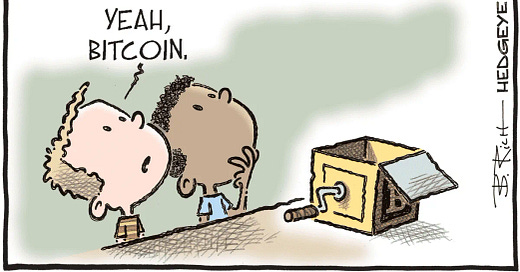Pennsylvania Paves the Way with Historic Bitcoin Reserve Act
With U.S. markets hitting record highs and Bitcoin surpassing $93k, Pennsylvania is moving to secure its financial future by placing Bitcoin directly on its balance sheet.
Dear Investors,
Welcome to this week’s edition of the Myth of Money. If you would like to keep in closer touch, please reach out on X below.
Following the presidential election, U.S. financial markets experienced a remarkable surge, propelling major indexes to unprecedented heights. The Dow jumped 3.6% in a single day, while all S&P 500 sectors showed positive performance, led by consumer discretionary, energy, and industrials.
In line with expectations, the Federal Reserve reduced its benchmark interest rate by 0.25% on Thursday, bringing the target range down to 4.50-4.75%.
Bitcoin also reached a record high, exceeding $93,000 on November 13, buoyed by optimism for crypto-friendly policies under the new Trump administration, which has floated the idea of a national Bitcoin reserve (more on that below).
In the bond market, Treasury yields saw some volatility but closed slightly lower, with the 10-year yield at 4.30% — while market anxiety eased significantly, reflected in a sharp drop in the Cboe Volatility Index (VIX). The global cryptocurrency market mirrored this optimism, climbing to a $2.79 trillion valuation.
Pennsylvania’s New Bitcoin Legislation: A Strategic Leap for State Finances
Pennsylvania is now charting an unprecedented course in the digital economy, aiming to place Bitcoin directly on its balance sheet. Proposed by Republican State Representative Mike Cabell, the Pennsylvania Bitcoin Strategic Reserve Act could allow the state treasury to allocate up to 10% of its $7 billion treasury funds into Bitcoin.
This landmark legislation follows closely on the heels of the recently passed Bitcoin Rights Bill, which enshrined residents' rights to self-custody crypto assets and use Bitcoin as a payment method.
For Pennsylvania, this move signals not just a commitment to financial innovation, but a deliberate choice to shield the state’s finances against inflation and volatility in traditional markets. Representative Cabell sees Bitcoin as a hedge—an alternative to traditional assets that may offer stability in uncertain economic times.
By authorizing the state treasury to invest in Bitcoin, Pennsylvania is attempting to preserve its financial health and resilience amid growing inflationary pressures.
Why This Move Could Matter
The Bitcoin Strategic Reserve Act brings the potential to reshape Pennsylvania’s financial landscape on several fronts.
First, Bitcoin could serve as an inflation-resistant asset, helping to protect state funds such as the General Fund and Rainy Day Fund against the dollar’s diminishing purchasing power.
Second, Bitcoin offers diversification for Pennsylvania’s portfolio, bringing an alternative to bonds and cash reserves, which are typically more vulnerable to market cycles. The state’s embrace of Bitcoin could attract tech-forward businesses and investors, bolstering Pennsylvania’s reputation as a financial innovator.
If Pennsylvania’s Bitcoin initiative gains traction, it might spark a state-level shift across the country. The Satoshi Action Fund, which provided the framework for this legislation, is already in discussions with at least 10 other states about similar bills.
Pennsylvania could set a precedent as the first U.S. state to hold Bitcoin on its balance sheet, encouraging other states to follow suit to attract crypto-driven economic growth.
A Broader National Trend
Pennsylvania’s proposed Bitcoin adoption arrives amid a wave of pro-crypto momentum, underscored by both President-elect Donald Trump’s vocal support and Senator Cynthia Lummis’s recent introduction of the Bitcoin Act of 2024.
This federal bill, which seeks to establish a U.S. Strategic Bitcoin Reserve, lays out a plan to purchase up to one million Bitcoin over the next five years using Federal Reserve remittances as funding.
As the bill moves through Congress, this initiative to bolster the dollar with Bitcoin reflects a strategic commitment to maintaining U.S. leadership in the crypto sphere, and recent market milestones—such as Bitcoin’s climb to $93,000—have amplified public and institutional interest.
For Pennsylvania, the Bitcoin Strategic Reserve Act could make it a pioneer among U.S. states in digital asset adoption, positioning its treasury to join the likes of investment giants BlackRock and Fidelity, which already use Bitcoin as a hedge against economic volatility.
If the legislation passes, Pennsylvania will set a precedent, not only enhancing its own economic resilience but also possibly catalyzing a broader shift across U.S. states toward digital asset reserves in public finance.
What I’m Reading This Week 📚
The Many Ways Crypto Won in This Election
The dust is starting to clear on the election, and no one won bigger than crypto. Aubrey Strobel looks at how the new Trump Administration could help the industry moving forward.
This Week By the Numbers
📈 Market Movements
💰 Crypto & Blockchain
🌐 Global Politics & Economy
🏢 Corporate News
Top Stories 🗞️
Powell says no need for Fed to rush rate cuts given strong economy
Ongoing economic growth, a solid job market, and inflation that remains above its 2% target mean the Federal Reserve does not need to rush to lower interest rates, Fed Chair Jerome Powell said on Thursday in remarks that may point to borrowing costs remaining higher for longer for households and businesses alike. Powell affirmed that he and his fellow policymakers still consider inflation to be "on a sustainable path to 2%" that will allow the U.S. central bank to move monetary policy "over time to a more neutral setting" that isn't meant to slow the economy.
Powell largely deflected questions about how new tariffs on imports or running the economy with fewer workers might alter the path of inflation the central bank has been trying to lower. "We can do the arithmetic. If there are fewer workers there'll be less work done," Powell said, before adding "this is getting me into political issues that I really want to stay as far away from as I possibly can."
As of now, he said the economy was sending no distress signal that might prompt the Fed to accelerate rate cuts, and to the contrary "if the data let us go a little slower, that seems a smart thing to do."
Trump’s Cabinet tracker: Here’s who is among the White House appointments so far
President-elect Donald Trump is filling key posts in his second administration, putting an emphasis so far on aides and allies who were his strongest backers during the 2024 campaign.
Here’s a look at who he’s selected so far.
18 states sue SEC, Gensler for ‘regulatory overreach’ on crypto
Eighteen Republican attorneys general sued the Securities and Exchange Commission (SEC) and Chair Gary Gensler on Thursday for allegedly overstepping the agency’s authority in its enforcement actions against the cryptocurrency industry.
The states, led by Kentucky Attorney General Russell Coleman, argue that the SEC has sought to “unilaterally wrest regulatory authority away from the States” on crypto enforcement.
“Instead of respecting that constitutional balance of power, and allowing States to develop and enforce their own tailored digital asset regulations based on their own policy priorities … the SEC’s assertion of sweeping jurisdiction without congressional authorization deprives States of their proper sovereign role and chills the development of innovative regulatory frameworks for the digital asset industry,” the complaint reads.
NY prosecutor suggests office will scale back crypto cases
A prosecutor with the United States Attorney’s Office for the Southern District of New York (SDNY) has suggested that authorities are devoting fewer resources to bringing cases involving cryptocurrency-related crimes.
Speaking at the Practicing Law Institute’s 56th Annual Institute on Securities Regulation on Nov. 15, Scott Hartman reportedly said there would not be “as much crypto stuff coming out of at least the SDNY in the future.” Hartman, the co-chief of the Securities and Commodities Fraud Task Force at SDNY, hinted that many of its criminal cases against high-profile executives like former FTX CEO Sam Bankman-Fried were filed in response to the crypto market downturn of 2022.
“We brought a lot of big cases in the wake of the crypto winter,” said Hartman. “There were a lot of important fraud cases to bring there, but we know our regulatory partners are very active in this space.”
Meta will face antitrust trial over Instagram, WhatsApp acquisitions
Facebook owner Meta Platforms must face trial in a U.S. Federal Trade Commission lawsuit seeking its break-up over claims that it bought Instagram and WhatsApp to crush emerging competition in social media, a judge in Washington ruled on Wednesday.
Judge James Boasberg largely denied Meta's motion to end the case filed against Facebook in 2020, during the Trump administration, alleging that the company acted illegally to maintain its social network monopoly.
Meta, then known as Facebook, overpaid for Instagram in 2012 and WhatsApp in 2014 to eliminate nascent threats instead of competing on its own in the mobile ecosystem, the FTC claims.
“Myth Of Money” Book - Available Now! 🤓
As many of you know, making financial education accessible has always been a passion of mine. After a year of hard work, I'm excited to announce that my new book, published by Wiley Publishing, is finally out!
This book is a thrilling blend of personal stories from the financial world, coupled with clear explanations of how things really work—from investment banking and stocks to venture capital, macroeconomics, and cryptocurrencies.
Thank you for reading this week’s edition of the Myth of Money.🚀
Were you forwarded this email? Subscribe below.
Until next week,
Tatiana Koffman & Katherine MacLellan
About the Author: Tatiana Koffman
Hi there and thanks for reading! If you stumble upon my newsletter, you will notice that I write about money, economics, and technology. I hold a JD/MBA and spent my career in Capital Markets working across Mergers & Acquisitions, Derivatives, Venture Capital, and Cryptocurrencies. I write to make financial topics more accessible and create equal opportunity for the next generation of investors. Currently working as a proud General Partner at Moonwalker Capital.
(More about me 👉 here).
About the Author: Katherine MacLellan
Katherine holds an MA (Hons) in Economics and International Relations from the University of St. Andrews, and a JD from Osgoode Hall. She has been thinking and writing about Bitcoin and blockchain technology since 2012.






